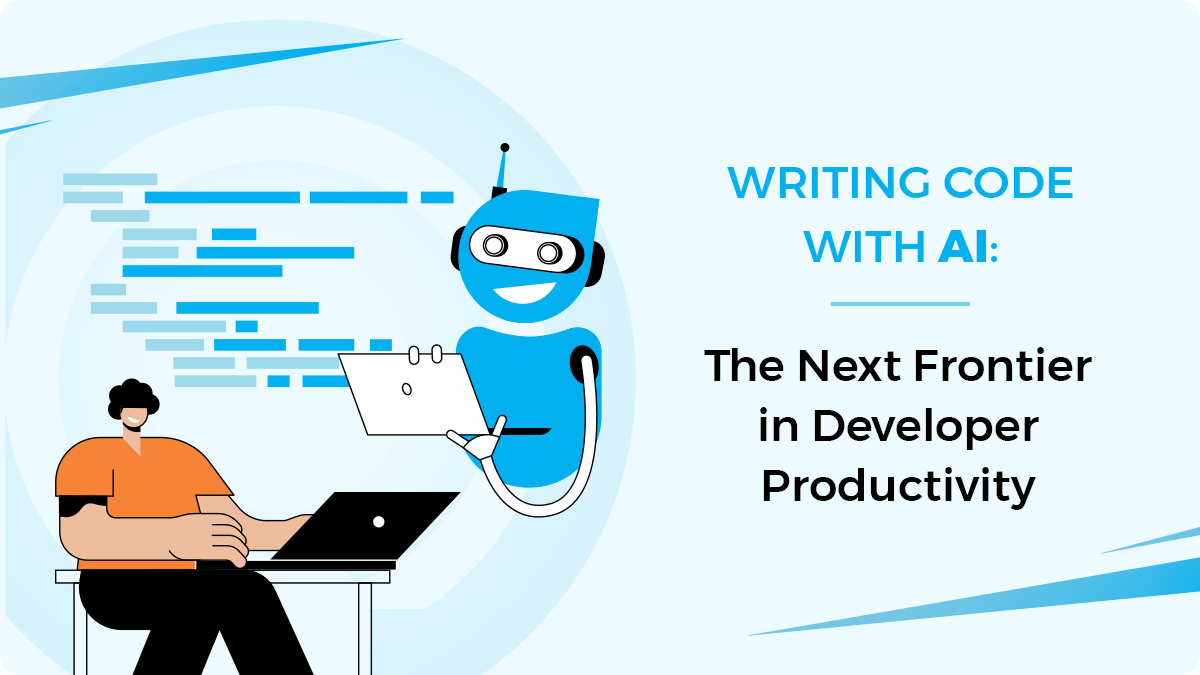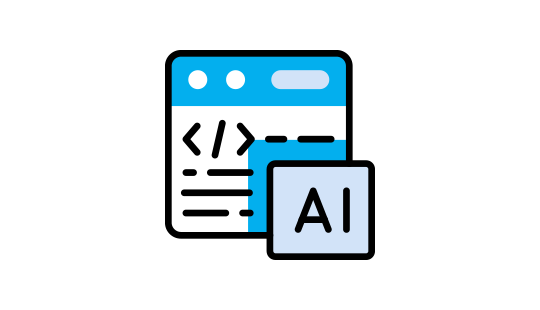Artificial intelligence (AI) plays a major part in the rapidly changing technology landscape and has a significant impact on a wide range of businesses. Software development is one field where AI is making major advancements. Writing code using AI is becoming the next big thing in developer productivity as developers struggle with challenging coding tasks and seek faster, more efficient development cycles.
From collaborative coding assistants to natural language interfaces and cross-language compatibility, this article paints a vivid picture of the exciting possibilities that lie ahead. As the realms of AI and coding converge, this article invites readers to embark on a journey into the next frontier of developer productivity, where the synergy between human expertise and AI innovation is poised to reshape the very fabric of software development. Strap in for a visionary exploration of the future of coding!

The Evolution of Coding Practices
Traditionally, coding has been a manual and iterative process, with developers typing out lines of code based on their understanding of a problem and its potential solutions. However, this approach has its limitations, especially as software systems become more intricate and sophisticated.
Over the years, various tools and frameworks have been introduced to streamline the coding process. Integrated Development Environments (IDEs) and code editors have improved the coding experience by offering features like syntax highlighting, auto-completion, and debugging tools. These tools have undoubtedly increased efficiency, but they still rely heavily on the developer’s manual input and decision-making.
Read more: User-Centric Design: Meeting the Expectations of Gen Z Audiences
Enter Artificial Intelligence
AI is changing the game by introducing intelligent automation into the coding process. Machine learning models, natural language processing (NLP), and other AI techniques are being leveraged to create tools that can assist developers in writing code more efficiently and accurately.
One notable application of AI in coding is code completion. Advanced code completion systems use machine learning algorithms to analyze the context of the code being written and suggest relevant code snippets or complete lines of code. This not only speeds up the coding process but also reduces the likelihood of syntax errors and bugs.
Another area where AI is making an impact is in code generation. With the help of deep learning models, AI systems can analyze patterns in existing codebases and generate new, contextually relevant code. This is particularly valuable when developers need to perform repetitive tasks or when working with large codebases where finding and reusing existing code can be challenging.
Enhancing Developer Productivity
The integration of AI into the coding workflow has several benefits that contribute to enhanced developer productivity.
-
Faster Development Cycles:
By automating routine tasks such as code completion and generation, developers can significantly speed up the development process. AI-powered tools understand the context of the code being written and can suggest or generate code snippets that align with the developer’s intent, reducing the time spent on manual coding.
-
Reduced Errors:
Human error is an inherent part of manual coding. AI-powered code completion and generation tools can help minimize errors by providing suggestions based on established coding conventions and patterns. This not only leads to more reliable code but also reduces the time spent on debugging and troubleshooting.
-
Learning and Adaptation:
AI systems can continuously learn from the developer’s coding patterns and preferences. This adaptive learning enables the tool to provide increasingly accurate and personalized suggestions over time, aligning with the developer’s coding style.
-
Focus on Creativity:
By automating repetitive and mundane coding tasks, developers can free up mental bandwidth to focus on more creative aspects of software development. This shift allows developers to dedicate more time to problem-solving, architectural design, and innovation.
-
Accessibility and Inclusivity:
AI-powered coding tools can make programming more accessible to individuals with varying levels of coding expertise. Beginners can benefit from intelligent suggestions and guidance, while experienced developers can leverage AI to explore new languages or frameworks more efficiently.
Challenges and Ethical Considerations
While the integration of AI into the coding process brings significant advantages, it is not without its challenges and ethical considerations.
1. Bias in Code Generation:
AI models are trained using pre-existing codebases that can include biases. If not carefully addressed, these biases can be perpetuated in the code generated by AI systems. Developers must be vigilant in ensuring that AI-generated code is free from discriminatory or unethical practices.
2. Overreliance on AI:
There is a concern that excessive reliance on AI-powered tools may lead to a decline in developers’ foundational coding skills. Striking a balance between leveraging AI for productivity gains and maintaining a solid understanding of coding principles is crucial.
3. Data Privacy and Security:
Large datasets are necessary for AI systems to have access to during training. Ensuring the privacy and security of codebases and sensitive information is paramount. Developers must carefully evaluate the security implications of using AI-powered tools and adopt best practices for safeguarding code.
4. Explaining Capabilities and Transparency:
Understanding how AI models arrive at specific code suggestions is essential for developers to trust and effectively use these tools. Ensuring transparency and Explaining Capabilities in AI algorithms is crucial for building confidence in their recommendations.
The Future of AI in Coding
As AI continues to evolve, the future of coding holds exciting possibilities. Advanced AI systems could evolve into true coding partners, understanding not only the syntax and structure of code but also the broader context of the software being developed.
1. Collaborative Coding Assistants:
Imagine an AI system that actively collaborates with developers in real time. This could involve suggesting improvements, catching potential issues before they arise, and even dynamically adapting to changes in project requirements.
2. Code Refactoring and Optimization:
AI could play a significant role in code refactoring and optimization, identifying areas for improvement and suggesting changes to enhance code performance, readability, and maintainability.
3. Natural Language Interfaces:
Advancements in natural language processing could lead to the development of coding interfaces that understand and respond to natural language commands. Developers could express their intentions in plain language, and the AI system would translate those commands into executable code.
4. Cross-Language Compatibility:
Future AI systems may seamlessly translate code between different programming languages, allowing developers to work in their preferred language while still collaborating with teams using different languages.
Read more: Creating a Winning Content Calendar for Social Media
Conclusion
Writing code with AI represents a transformative shift in the way developers approach software development. The integration of intelligent automation not only accelerates the coding process but also empowers developers to focus on higher-order tasks that require creativity and problem-solving skills. While challenges and ethical considerations must be addressed, the potential benefits of AI in coding are immense.
As we stand at the intersection of artificial intelligence and software development, the collaboration between humans and intelligent machines promises to redefine the boundaries of what is possible in the world of coding. Embracing this evolution and navigating the ethical considerations will be key to unlocking the full potential of AI in enhancing developer productivity and shaping the future of software development.
